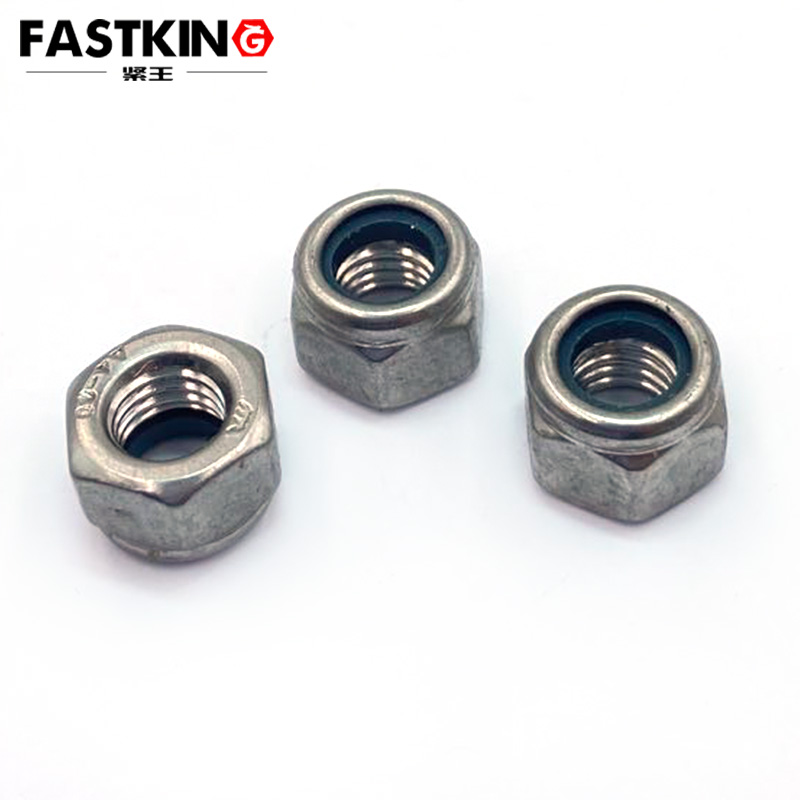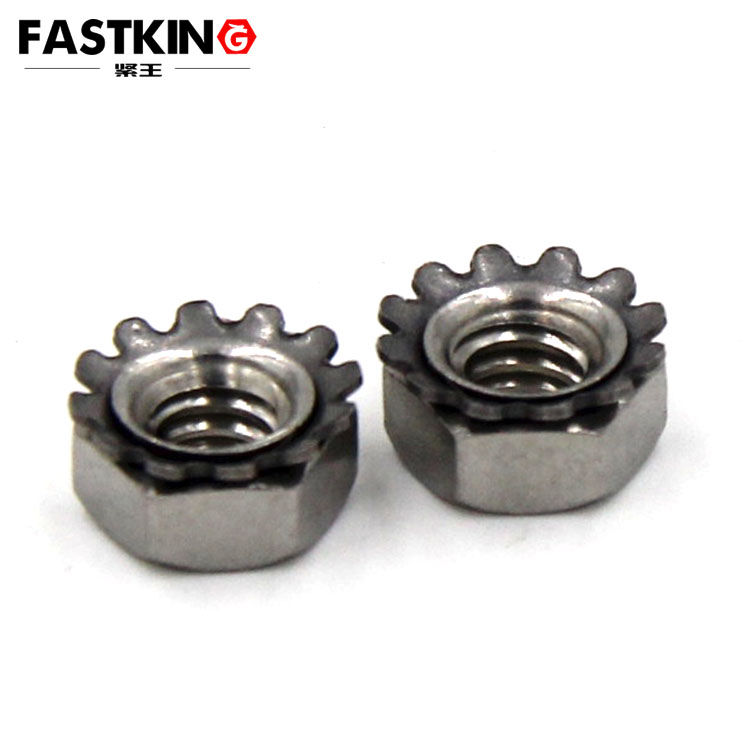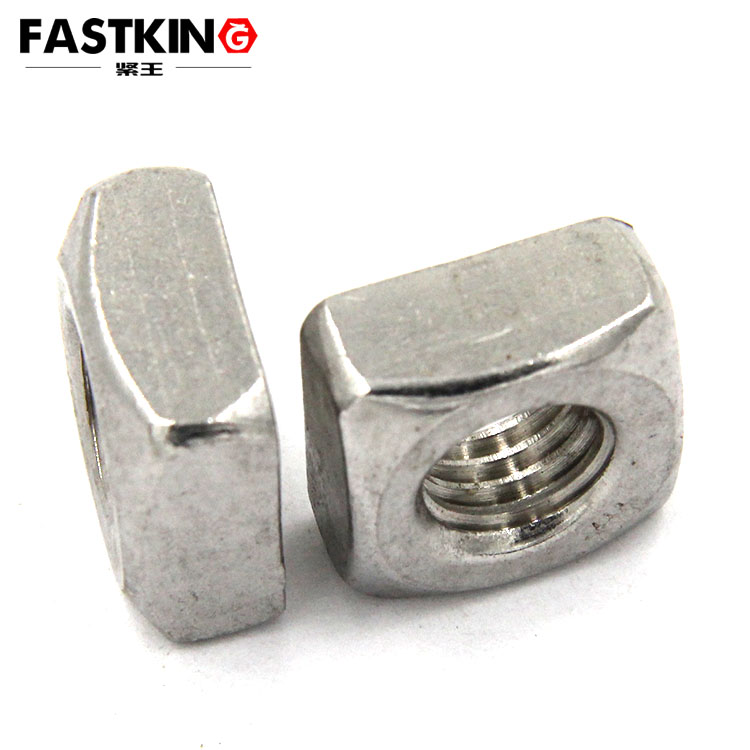Nylon lock thick nut din982
Material: stainless steel 304316, grade 8.8 high strength and grade 12.9 high strength
It can also support non-standard customization.
The core competitiveness of nylon lock thick nuts stems from the synergistic design of "nylon anti-loose ring + thickened body", which respectively address the two major industrial pain points of "loosening failure" and "insufficient load-bearing capacity". First, let’s look at the anti-loosening mechanism of the nylon anti-loose ring: unlike traditional anti-loose methods (such as spring washers and lock washers) that rely on "increasing friction", nylon rings adopt the "physical interference locking" principle — when the nut is tightened with the bolt, the nylon ring is squeezed and deformed, and its elastic material embeds into the flank clearance of the bolt thread, forming "reverse resistance": on one hand, the elastic restoring force of nylon continuously exerts radial pressure on the thread pair, maintaining the positive pressure between threads and preventing gap enlargement caused by vibration; on the other hand, the deformed nylon ring forms "meshing locking" with the bolt thread, which can prevent the circumferential rotation of the nut relative to the bolt even under high-frequency vibration. The advantages of this anti-loosening method lie in "long-term effectiveness" and "reusability" — the elasticity of ordinary spring washers attenuates after repeated disassembly, while high-quality nylon rings can be reused 3-5 times and still maintain anti-loose effects, significantly reducing maintenance costs.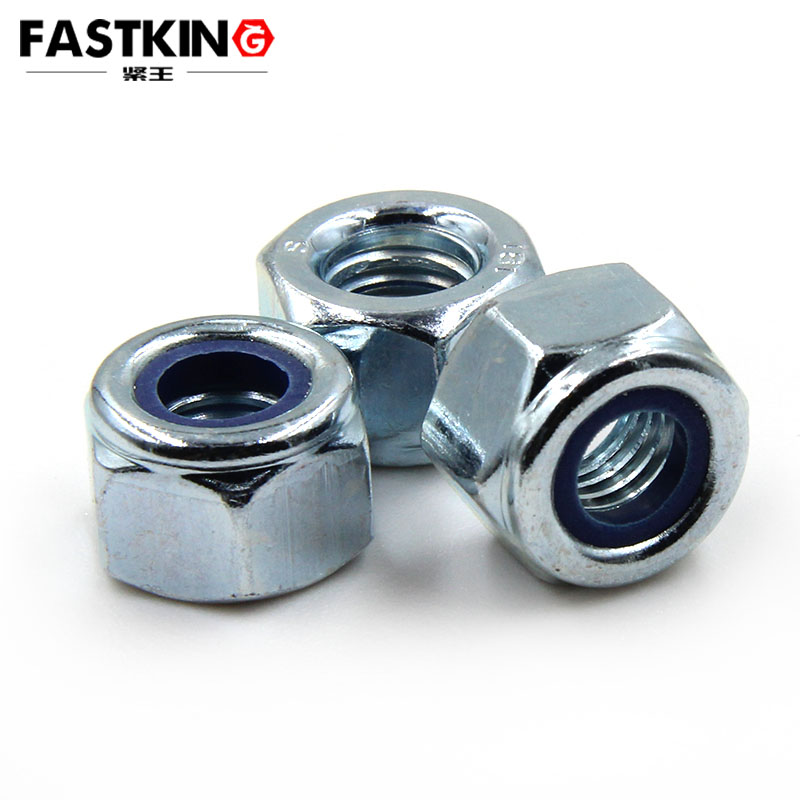
Next, let’s explore the structural advantages of the thickened body: due to their thin thickness, ordinary nuts are prone to body deformation or thread stripping when bearing axial loads or shear forces, especially in scenarios involving thick connected parts (such as steel plate splicing in construction machinery and bracket fixing in automobile chassis), where their adaptability is insufficient. However, the thickened design of nylon lock thick nuts brings three key improvements: first, "enhanced shear strength" — the thickened body increases the contact area between the nut and the connected part, dispersing shear force. For example, the shear resistance load of an M12 carbon steel nylon lock thick nut can reach 80kN, which is 30% higher than that of ordinary nuts; second, "adaptability to thick connected parts" — it can meet the needs of thick plate connection without additional washers, reducing the number of assembly parts and improving installation efficiency; third, "enhanced stability" — the thickened structure reduces the risk of tilting (commonly known as "eccentric load") during nut tightening, avoiding bolt bending or nut damage caused by uneven force application, and is particularly suitable for mass production on automated assembly lines.
In terms of application scenarios, relying on the characteristics of "reliable anti-loosening + high strength", nylon lock thick nuts have become "standard fasteners" in multiple industries. In the automotive industry, they are core anti-loose components for engine compartments and chassis: bolts for engine brackets and connecting nuts for drive shafts need to withstand high-frequency vibration and temperature changes (-30℃ to 120℃ for a long time); nuts with nylon 66 rings and 304 stainless steel bodies can prevent abnormal noise or component falling caused by loosening; at the connection points of the chassis suspension system, the thickened body can adapt to thick steel plates, ensuring the driving stability of vehicles on bumpy roads. In the construction machinery field (such as excavators and cranes), working conditions are more severe — with dust, muddy water, and impact loads intertwined. At this time, carbon steel nylon lock thick nuts with Dacromet surface treatment (with salt spray resistance of over 1000 hours) can not only resist corrosion but also maintain tightness under the vibration of hydraulic systems. For example, for the pin nuts of excavator buckets, the use of this type of nut has extended the maintenance cycle from 3 months to 1 year.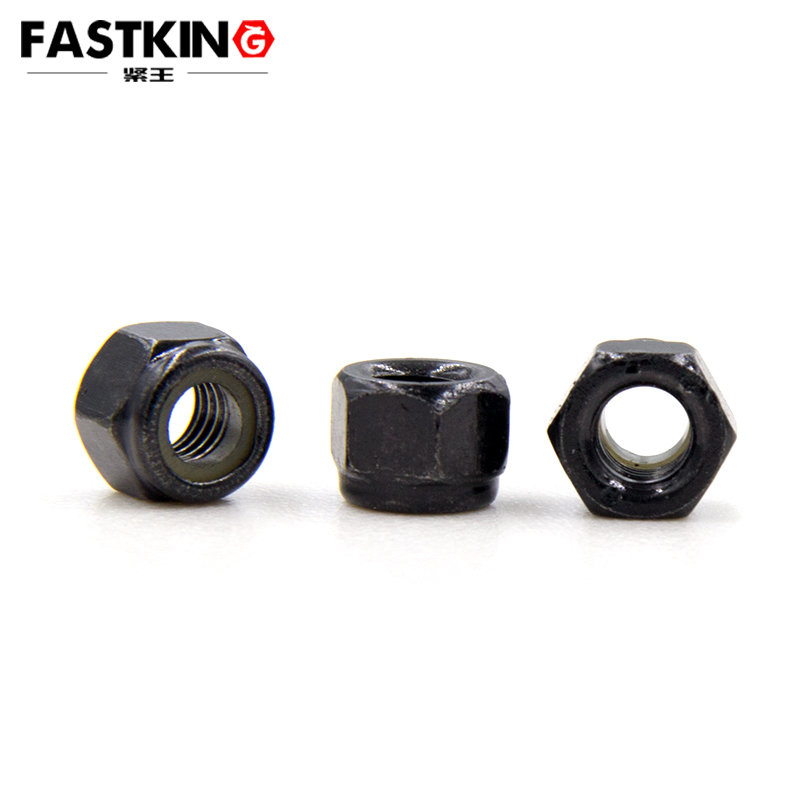
In the electronics and precision equipment field, the "damage-free anti-loosening" advantage of nylon lock thick nuts is prominent: for the crossbeam connection of server cabinets and the bracket fixing of medical equipment, it is necessary to avoid wear between metal parts; the elastic contact of the nylon ring can buffer vibration and prevent thread scratches at the same time; for the terminal nuts of photovoltaic inverters, the thickened body can adapt to the thick shell of the terminal box, and the nylon anti-loose ring can prevent nut loosening caused by environmental temperature changes (exposed to 60℃ during the day and dropping to 10℃ at night), ensuring stable power transmission. In addition, in scenarios such as rail transit (high-speed rail seat brackets) and home appliances (washing machine drum bearing end caps), it has also become the preferred choice for improving production efficiency due to its characteristics of "easy installation and no need for additional anti-loose parts".
When selecting and using nylon lock thick nuts, the principle of "working condition adaptation" must be followed: first, temperature matching — the maximum temperature resistance of ordinary nylon 66 rings is 120℃; if applied in high-temperature areas such as engine exhaust pipes (where the temperature exceeds 150℃), modified nylon (such as PA66+PTFE) or all-metal anti-loose nuts should be selected; second, material matching — for humid or corrosive environments (such as marine equipment and chemical pipelines), 316 stainless steel bodies are preferred, while carbon steel galvanized materials can be used in ordinary industrial scenarios; third, installation specifications — a torque wrench must be used to control the torque during tightening (e.g., the recommended torque for M8 nuts is 18-22N・m) to avoid nylon ring breakage due to over-tightening or insufficient anti-loose effect due to insufficient torque. At the same time, attention should be paid to the matching of thread specifications — the thread precision of the nut and bolt must be consistent (e.g., both 6H/6g) to prevent the weakening of anti-loose effects caused by excessive fitting gaps.
From the perspective of industry development, the design evolution of nylon lock thick nuts reflects the upgrading trend of fasteners from "single connection" to "functional integration": it integrates the two functions of "anti-loosening" and "high-strength load-bearing" into one, without relying on the combination of multiple parts, which not only simplifies the assembly process but also improves connection reliability. In emerging fields such as intelligent manufacturing and new energy vehicles, as equipment requirements for vibration protection and long service life continue to increase, the application scenarios of nylon lock thick nuts will be further expanded — for example, the connection of new energy vehicle battery packs needs to meet the requirements of anti-loosening, corrosion resistance, and lightweight at the same time; in the future, new products using carbon fiber-reinforced nylon rings + aluminum alloy bodies may appear, promoting anti-loose fasteners to develop in the direction of "lighter weight, better weather resistance, and higher intelligence"


